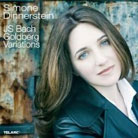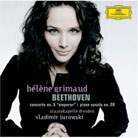November 2007
Simone Dinnerstein has also recorded Beethoven -- with the cellist Zuill Bailey in all the works for their two instruments, on Delos -- but her sudden fame and lineup of prestigious engagements abroad are traceable to the Goldberg Variations, which she performed in her Carnegie Hall debut in November 2005. Word that she had taped this recording eight months earlier created a buzz, and the CD itself can only win more admirers for this mature artist. Only the most thorough understanding of the work could have enabled her to deliver it with the sense of spontaneity evident here. The scampering Variation 5, in fact, almost gets away from her, but overall this is a very persuasive realization, reminding us of the days when musicians old enough to drive recorded the music they had lived with, rather than learning a piece during a recording session. Miss Dinnerstein takes all repeats, brings a sense of contemplative reverie to the Aria at the beginning and end of the long sequence, and seems to have an instinctive sense of the right character for each of the 30 variations. There are other fascinating accounts of this endlessly fascinating work, and they retain their appeal, but the appeal of this one (which benefits more than incidentally from Adam Abeshouse’s beautifully focused recording) is such that it renders comparisons rather beside the point. It is not so much a "contender" as simply something to be vastly savored on its own persuasive terms. GO BACK TO: |
 Bach - Goldberg Variations
Bach - Goldberg Variations Beethoven
- Piano Concerto No. 5 in E flat ("Emperor")*; Sonata in A major, Op. 101
Beethoven
- Piano Concerto No. 5 in E flat ("Emperor")*; Sonata in A major, Op. 101